
Healthy and satisfied employees -
these are the positive effects:
Everyone talks about how important it is for employees to feel good and stay mentally healthy at work. But how can you face this challenge in practice? Our current study results* have shown that even the smallest changes can sustainably motivate and strengthen your employees - and this has a positive effect on all teams and the entire company. Find out the latest figures about wellbeing and satisfaction in the workplace and how employees around the world feel about it. Here's a little taster: 57% of respondents agree that personal development opportunities influence their decision whether to stay at a company - and for how long!

The state of the mental health and wellbeing of employees worldwide.
Together with the market research agency Markteffect, we asked more than 20,000 employees from various positions, industries and countries to share their opinions and experiences on mental health and wellbeing in the workplace with us*. But before we really get into the topic, here is a brief overview of the most important facts.
- Employees feel exhausted and overworked to an alarming extent, but don't (yet) dare to speak up when the stress is overwhelming them.
- We surveyed employees from several countries and mental health is a top priority.
- What employees want most is more stress management skills that they can use to improve their wellbeing.
- If you promote strong social relationships in the workplace, your employees will automatically feel more comfortable.
- You have no time to lose: If your employees cannot develop personally, dissatisfaction in the workplace and the tendency to leave the company increase.
1. One in five employees are stressed:
Just because your employees don't talk about it when they're stressed doesn't mean stress at work isn't a problem. Our survey clearly shows that burnout rates in the workplace are extremely high - almost one in five employees experienced (very) strong signs of stress/burnout in the last year (18%). That's exactly why it's important to support your employees in actually addressing their problems. In fact, half of those surveyed never told their employer how stressed they actually were. No wonder, as 22% of employees feel slightly or even very uncomfortable talking about mental health issues in their company.
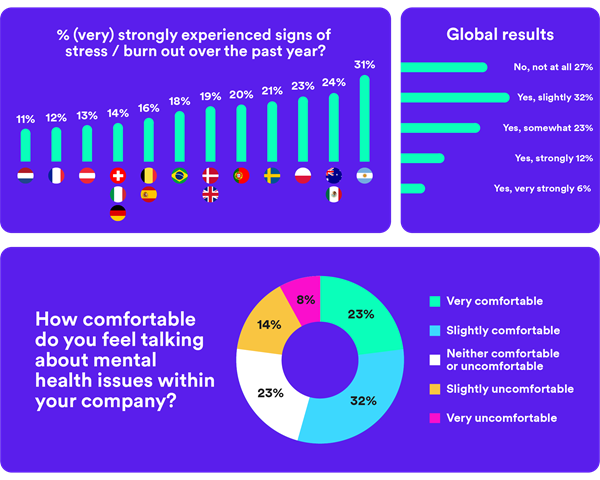
2. Mental health is paramount.
Employees have to feel good in order to be successful professionally and privately. And that's not just what we say, it's what workers around the world say - mental wellbeing is everyone's priority. Incidentally, Brazil (73%), Portugal (65%) and Spain (63%) are at the top. Here you can see which topics are most important globally.
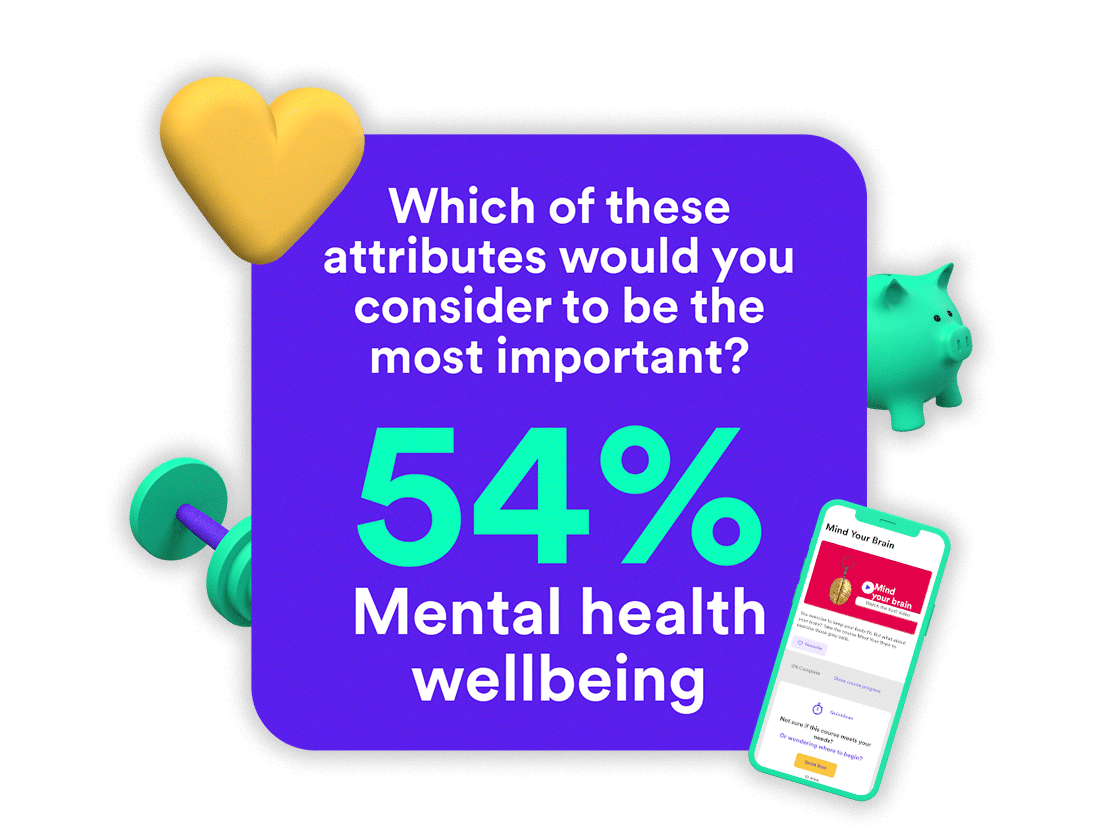
Almost four out of five employees see a clear connection between their job satisfaction and their general wellbeing (78%). This shows how much work and private life influence each other. It is also interesting that most employees (63%) wish their managers would regularly inquire about their wellbeing. It is therefore important that team leads receive more training in this area.
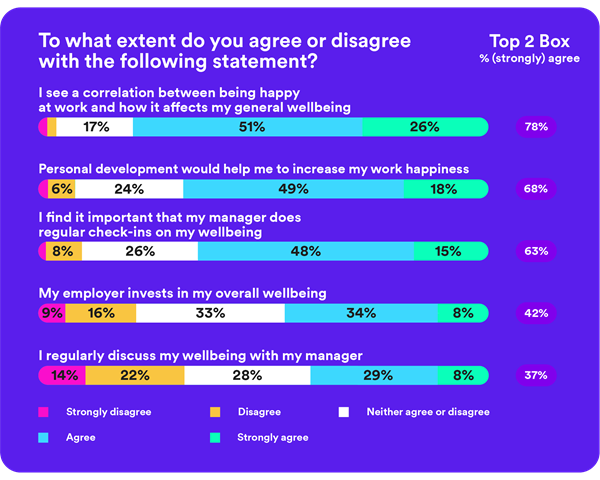
3. Skills
We asked employees to choose a skill that they believe has the most impact on their wellbeing. There is a clear favourite: stress management skills. These can be approaches and strategies that combat or at least reduce stress and its associated negative effects. You and your employees will learn this, for example, in courses such as “Don’t be afraid of stress”, “Resilience” and “The power of breathing.” Communication skills have the second greatest influence on the wellbeing of the people surveyed.
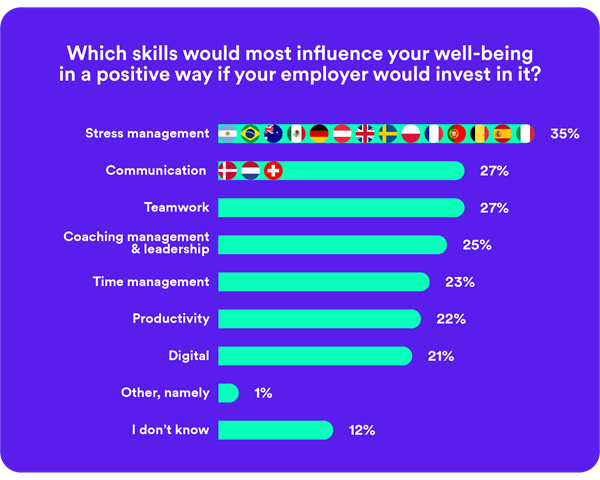
4. Strong relationships
There are many benefits to creating a work environment where trust, mutual support and open communication are a given: higher employee satisfaction, better performance, less stress and more wellbeing in general. Let's take a closer look at what our respondents think about it.
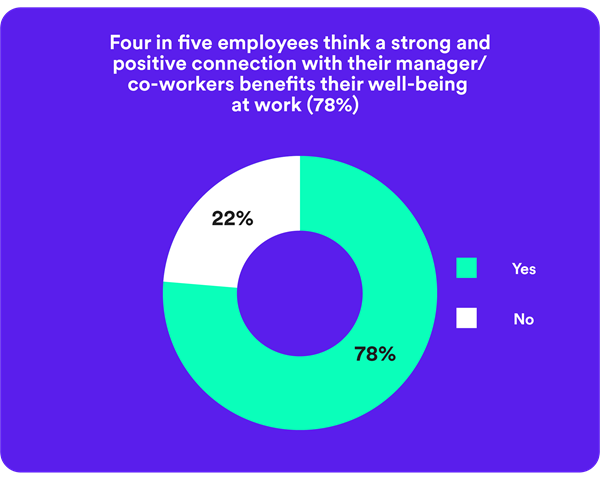
5. Focus on wellbeing
It may seem like a huge challenge to take sufficient measures to strengthen the mental health and wellbeing of your employees. But doing nothing isn't a solution - our research showed that 67% of respondents (strongly) agree that personal development would make them happier at work. A total of 84% of respondents even stated that they would leave the company within a year due to a lack of personal development opportunities. Poland (93%), Switzerland (90%) and the United Kingdom (90%) top this list.
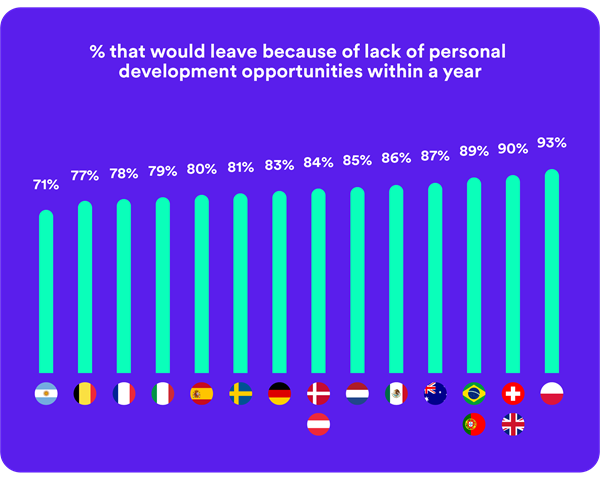
Let's take a closer look...
Now you're probably curious to see what else we found out, right? No problem, we will be happy to provide you with regional data and facts from the UK
Time for some industry-specific developments.
Let's take a closer look at the trends that have been particularly evident in the following industries:
Healthcare
Mental health is ranked as the most important issue in relation to general well-being among healthcare workers (56%). Financial security comes second (15%).
The top 3 skills to increase well-being are stress management (39%), teamwork (28%) and communication (27%).
The most popular learning content is Coping With Aggression, Do Your Thing and The Power of Sleep.

FMCG
Here too, mental health is rated as the most important factor for greater wellbeing (52%). Next comes financial security (17%).
The top 3 skills to increase wellbeing are stress management (34%), communication (29%) and teamwork (27%).
The most popular learning content is Coaching Management, Conversation Techniques: LSD and Information Security.

Professional Services
People who provide professional services also consider mental health to be the most important aspect of their wellbeing (55%). Financial security comes second (17%).
The top 3 skills to increase well-being are stress management (34%), coaching, management and leadership (27%) and communication (27%)
The most popular learning content is Change Management, Think Outside the Box and Storytelling.

*Verifiability of research and information on the sample
A total of 24,235 people were interviewed as part of this study. Based on this information, the answers can be generalized to the entire target group with a certainty of 95% and an accuracy of 0.6%.
Target groups: Working people between the ages of 25 and 65 who have at least secondary school education.
Research method: Qualitative online research together with the research agency Markteffect, consisting of a questionnaire with a total of 34 questions. The investigation was conducted in November 2022.
